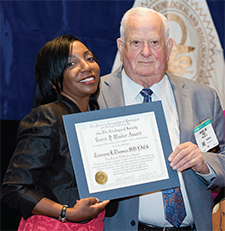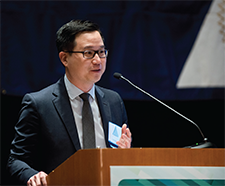Harris P. Mosher Award
Giovana R. Thomas, MD, associate professor of otolaryngology at the University of Miami in Florida, was awarded the Mosher Award in recognition of her thesis in clinical research, “Human Papillomavirus (HPV) Induced Oropharyngeal Cancer in Hispanics in the U.S.: Differences in Clinical Presentation and Survival Outcomes.”
Explore This Issue
July 2016Dr. Thomas’ study is the first to describe the clinical details of Hispanic patients with HPV-induced oropharyngeal squamous cell carcinoma (OPSCC).

Giovana R. Thomas, MD and TRIO President Fred Owens, MD
The incidence of HPV-induced OPSCC is increasing at an epidemic rate. Specifically, in the years 1988-2004, incidence of the disease increased by 225%. Likewise, research on the subject has increased, leading to a greater understanding of what Dr. Thomas described as a new and peculiar disease. In general, patients with HPV-induced OPSCC are middle-aged Caucasian men who are, more often than not, professionals with a history of multiple sexual partners. Thankfully, HPV-related OPSCC carries a favorable survival rate.
Most research on HPV-induced OPSCC, however, has focused on non-Hispanic whites, overlooking the Hispanic population, which is already the nation’s largest minority group, with 42 million individuals in 2005. Moreover, the Hispanic population is expected to triple in size by the year 2050. Dr. Thomas described the need to offer this growing population the best possible care. In order to help achieve this goal, she and her colleagues sought to determine disparities in survival outcome and clinical presentation between Hispanic and non-Hispanic whites. As physicians at the University of Miami Hospital, they took advantage of the fact that Miami has a very large Hispanic population, using the Hospital Tumor Registry Database to identify patients with OPSCC who presented between 2008 and 2014. The researchers identified 237 patients with OPSCC with well-documented HPV and/or p16 positive status. Of these, 167 were non-Hispanic whites and 70 were Hispanic. The demographics of the two groups were otherwise similar.
The patients had a mean age of 59 years. The majority of patients (84%) presented in advanced stages, and the majority (66%) had past or current history of alcohol use. The overall death rate in the study was 10%, and Dr. Thomas and colleagues found no significant difference between the Kaplan-Meier survival curves of non-Hispanic whites and Hispanics. Age was the only factor that had a significant effect on outcome, and this effect was similar in both groups.
Dr. Thomas did, however, identify some statistically significant differences between the groups in their presentation of disease. Specifically, 70% of Hispanic patients presented with primary disease, compared to 56% of non-Hispanic whites. Additionally, women represented a statistically significant larger proportion of HPV-positive Hispanic patients (26%) as compared with non-Hispanic whites (9%). Thus, the differences between the two groups were in the increased representation of women in the Hispanic group and the increased likelihood of primary disease in the tonsil region in the Hispanic group.
Edmund Prince Fowler Award
Paul Hong, MD, associate professor in the division of otolaryngology–head and neck surgery at Dalhousie University in Halifax, Nova Scotia, was awarded the inaugural Maureen Hannley Award for his thesis, “Parental Decision Making in Pediatric Otoplasty: The Role of Shared Decision Making in Parental Decisional Conflict and Decisional Regret.”
The Maureen Hannley Thesis Award was established this year to honor Dr. Hannley’s legacy and contributions to the Triological Society. As the diversity of the academic and scientific work of the otolaryngology community evolved, Dr. Hannley acknowledged the importance of alternative scholastic contributions to the society, those that fall outside the traditional realms of basic and clinical research. The award will be presented annually to a candidate whose thesis represents an outstanding contribution in the alternative science category of technology/procedure development, otolaryngology status and trends, health services research, or historical perspectives.

Paul Hong, MD
As the first recipient of the Hannley Award, Dr. Hong gave a special acknowledgement to Dr. Hannley, who provided feedback on his thesis.
He defined shared decision making as the process by which the provider and patient work together and share information. Shared decision making is especially important in situations with more than one treatment option, “preference-sensitive” conditions, and/or little evidence to support one choice over another. In an acknowledgment of the large variation in medical practice, shared decision making allows for the incorporation of patient values and preferences into the medical conversation. Not surprisingly, shared decision making is emerging as an area of research associated with measures of quality and patient-centered care.
Dr. Hong explained that some physicians are reluctant to engage in shared decision making. Often, these physicians justify their stance by asserting that patients are not interested in decision making. Dr. Hong proposed an alternative possibility: Many physicians do a poor job of identifying patient preferences.
His study included 65 consecutive patients who completed the decisional conflict scale (DCS), which reflected their uncertainty about the decision of whether or not their child should have surgery. Dr. Hong reported that 33% of patients scored 25 or higher on the DCS, indicating that they were experiencing significant decisional conflict. Further analysis of the population revealed that parents who believed they were engaged in the decision making had lower levels of decisional conflict, as well as less decisional regret.
Thus, shared decision making not only benefits the patient, but it may also strengthen health systems by improving quality of care and increasing patient satisfaction. While the results of the study are intriguing, there are still many unanswered questions in the field of shared decision making. For example: Which interventions are most likely to increase parents’ involvement in decision making? Is it possible to quantify the effects of significant decisional conflict and decision regret on health outcomes?
As these questions are answered, physicians will need to increase their focus on the patient so that the patient feels included in the discussion. After all, shared decision making is at the core of ethical, patient-centered care, which is the heart of the Triological Society.
Lara Pullen is a freelance medical writer based in Illinois.